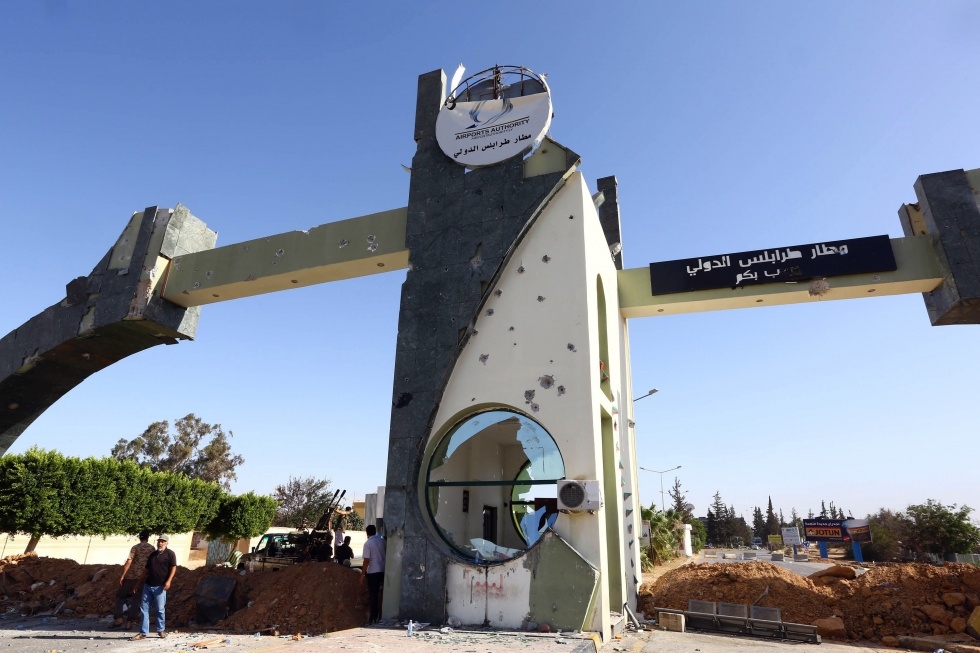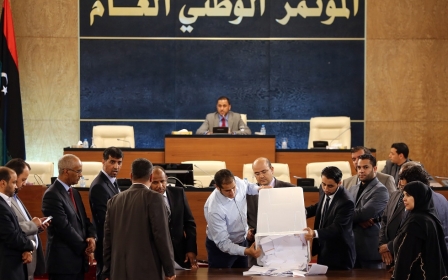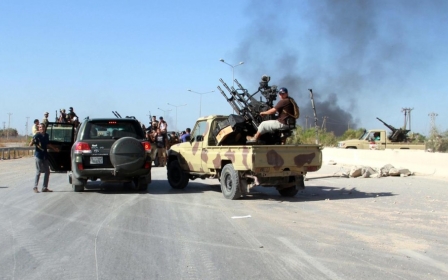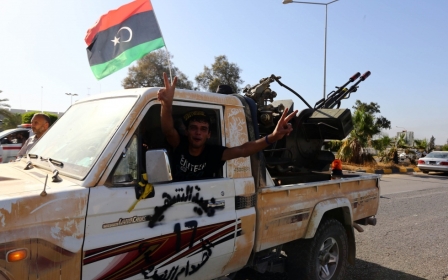Options for Libya’s government with Tripoli now controlled by Libya Dawn
After Libya Dawn militias, still on the government payroll, take Tripoli airport, what are the next steps for Libya's government?

Libya Dawn fighters stand at the entrance to Tripoli International Airport on Saturday (AFP)
Published date: 12 February 2015 21:45 GMT
|
Last update: 9 years 9 months ago
Libya’s government pleaded for foreign intervention on Monday as Islamist militias consolidated their hold on Tripoli with attacks and house burnings against government supporters. But there is little appetite abroad for involvement in the latest Middle Eastern powder keg.
Foreign minister Mohammed Abdul Aziz, meeting Egyptian officials in Cairo, repeated calls for military advisors and weapons to guard Libya’s strategic installations, amid fears that the country is disintegrating.
That disintegration is pronounced in Tripoli, where an alliance of Islamist and Misrata militias, named Libyan Dawn, consolidated its hold on the city after capturing the international airport at the weekend.
The retreat of pro-government militias from the airport and western suburbs has brought an end to five weeks of bombardments that had devastated parts of the city, but into the void have come armed gangs attacking homes and businesses.
Libya Dawn completed its break from the elected parliament, the House of Representatives, by re-convening the former dissolved parliament, the general national congress, and appointing a former Islamist guerrilla chief as the new “prime minister.”
Omar al Hasi, a former senior figure in the Libyan Islamic Fighting Group, a resistance group that fought Muammar Gaddafi in the 1990s, will head the new Libya Dawn administration, his duties yet to be defined.
Islamist and Misratan leaders insist the former congress is the true parliament because, technically, the House of Representatives, elected in June, failed to honour a pledge for a handover ceremony between the two bodies.
Dawn militias have begun mass round-ups of government supporters, setting fire to homes of journalists and key officials in Tripoli, while deploying units to guard approach roads to the capital.
Denounced by the elected parliament as a “terrorist formation,” Dawn appears intent on controlling territory stretching from the capital 100 miles east to the city of Misrata, an area that contains more than half Libya’s six million population.
Dawn militias, having captured the city’s main airport at the weekend from the pro-government Zintan militia have set it ablaze, apparently concluding that the site, close to the front line with pro-government forces, was too difficult to defend. Their commanders seem to have decided that they already have two airports - Tripoli’s city centre Miteega and Misrata International - which are more easily defended.
They have also won support from Ansar al Sharia, the Islamist brigade in the eastern city of Benghazi which is accused by the United States of the murder of its ambassador in 2012. Ansar has been battling with both the army and nationalist militias under rogue general Khalifa Hiftar for the past three months, capturing much of Benghazi in the process, and has now proclaimed a united front among Islamists, calling for an alliance to “reject democracy.”
The elected parliament is based in Tobruk, the eastern-most of Libya’s cities, and one of the few to be spared militia violence, and its options are limited by the lack of force at its command.
On Monday it appointed a new chief of staff, army colonel Abdel Razzak Nadhim, backed by 88 of the 124 lawmakers in attendance with Islamist and Misratan members boycotting the assembly. Nadhim promised decisive action, but has only two regular brigades under his direct command, Al Saiqa (Lightening) special forces brigade and Zawiya Martyrs, an infantry unit named in honour of the sacrifices of rebel units in Zawiya during the 2011 uprising.
Both units are in the east, their hands already full battling Ansar al Sharia and its allies from the Libya Shield militias.
Any move to recapture Tripoli would depend on a collection of western militias including tribal units from Washafani and Warfala and ethnic Tobu in south west Libya, along with Zintan militias, led by the Sawac brigade, trained and equipped as a regular armoured infantry unit.
The wild card in the military equation are two infantry brigades, based in south-east Tripoli, which came briefly onto the streets in November after Misratan militias killed 42 protestors in the district of Ghargour, only to retreat to bases where they remain. So far neither they, nor Tripoli’s thousands of newly-trained police, have shown appetite to assert themselves against Libya Dawn.
Limited air power appears to be available, as evidenced by two days of air strikes last week against Misrata militias in Tripoli which struck ammunition dumps and command centres, but the force lacks tanks and has already suffered five weeks of brutal fighting before withdrawing from the capital.
More realistically, the government may need to come to terms with the loss of the capital to Libya Dawn, which appears determined to impose Islamist governance on Tripoli.
Diplomats say the most powerful weapons in the parliament’s armoury are economic, not military.
As the internationally recognized government, the House of Representatives has access to $158 billion in estimated foreign assets and reserves, along with income from oil after the end of a 12-month militia blockade. The blockading militias, under charismatic commander Ibrahim Jathran, had opposed the Islamist-led congress, but are now at one with its non-Islamist replacement, and content to let the oil flow.
Libya’s oil fields, holding the largest reserves in Africa, lie in two belts, one in the east, one in the far west, both for the moment controlled by tribes and forces loyal to the government.
Forces from what was later named Libya Dawn made an assault on eastern oil ports earlier this year, when Misratan brigades pushed eastwards along the coast towards Es Sidre, one of a chain of four ports through which the bulk of the country’s oil flows. The attack failed, with a mixture of tribal and regular army units massed at the Red Wadi, a valley running north-south which provides a powerful natural barrier.
In the longer term, control of the country’s purse strings will give the elected government the ability to upgrade its forces, while starving Islamist brigades of finance. Libya Dawn must also contend with controlling a capital, Tripoli, which is likely to resist attempts to impose tight controls.
Libya Dawn may also find that it becomes increasingly isolated, as an enclave within Libya outside international law. It controls two key airports, but both are now being shunned by airlines, with the government designating Zuwara, an Amazigh town near the Tunisian border, as its new official gateway for the west of the country.
One of the paradoxes of Dawn’s power grab is that for the moment, its militias are still on the government payroll, depending on it for their salaries. Parliament last week promised to keep paying all militias until December 31, but may revise this decision after the fall of Tripoli.
The sudden cut in income, coupled with resentment from the capital’s populace at what amounts to military occupation, may also cause the Dawn alliance to fragment. Its Misrata militia component may fall away as businessmen face the prospect of an end to trade on Misrata port, the largest in the country because shippers worry about the risk of docking in a port outside official control. That would leave Dawn’s principle Islamist brigades, Libyan Revolutionary Operations Room and Janzour Knights, to police Tripoli’s two million inhabitants alone.
New MEE newsletter: Jerusalem Dispatch
Sign up to get the latest insights and analysis on Israel-Palestine, alongside Turkey Unpacked and other MEE newsletters
Middle East Eye delivers independent and unrivalled coverage and analysis of the Middle East, North Africa and beyond. To learn more about republishing this content and the associated fees, please fill out this form. More about MEE can be found here.




